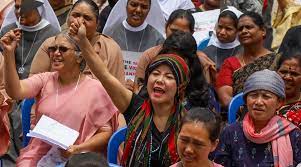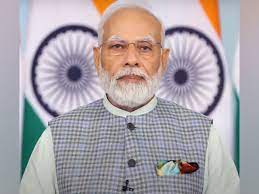Manipur: The Center claims it was unable to assist women victims since civil society resisted; the SC will create a panel of female judges for victims
The Centre has told the Supreme Court that due to opposition from the local civil society, authorities in Manipur were unable to assist women who had been the victims of assault.
The Supreme Court, for its part, warned that Manipur’s time to recover was running out and urged the creation of a system to stop violence against women.
Since the video of two tribal women being paraded nude and touched by a crowd went viral last month, violence against women in Manipur has been a concern. The event happened on May 4, one day after ethnic unrest broke out in Manipur between the Meitei and tribal tribes of the state. Since then, thousands of people have been displaced and more than 150 people have died.
The Supreme Court said that it would create a panel of female justices who would be backed by members of civil society, ensuring that “justice goes to her [the victim’s] doorstep.”
Chief Justice of India (CJI) DY Chandrachud described the violence in Manipur as “unprecedented” and said that it cannot be compared to occurrences of violence in West Bengal or Rajasthan during his intervention in the hearing of a number of petitions pertaining to the violence in Manipur.
The Apex Court also took notice of the delay in filing a report and starting a probe into the occurrence on May 4. The court also requested that the roughly 6,000 FIRs filed in Manipur be divided.
unable to contact victims due to opposition from civic society: Center
On Monday, the Centre informed the Supreme Court that the opposition of civil society prevented state officials from reaching the woman victims in Manipur.
Because of “resistance from civil society organizations in Churachandpur,” where the victims and their families had fled following the tragedy, state officials had been unable to physically or verbally contact the victims, according to the Centre’s submission to the Supreme Court, according to The Indian Express.
An all-female team made up of two psychiatrists and a psychologist from Churachandpur District Hospital has been assembled to aid the victims, according to the Centre, according to The Express.
The police have so far made seven arrests in relation to the case of two indigenous women who were displayed in their undies and reportedly suffered sexual abuse. The equipment that was utilized to record the video has also been located. Only this month, when the video appeared and sparked indignation around the country, did the event, which happened on May 4, become widely known.
The Supreme Court will assemble a female judge panel.
In order to secure justice for the woman victims in Manipur, the Supreme Court said on Monday that it will assemble a panel of female justices and representatives of the civil society.
To stop situations like the attack on women on May 4 from happening again, the Center notified the court that all such cases will be referred to the Manipur Director General of Police (DGP), who would personally monitor the investigations, according to The Express.
However, the Apex Court pointed out that a victim who has been abused and has lost family members to violence may not be able to contact the authorities; in this situation, justice must go to the victim. The Apex Court announced that a panel of female judges will be assembled for this purpose.
“Trusting CBI or SIT alone would not be sufficient. A scenario where a 19-year-old lady who has lost her family is living in a relief camp will have to be visualized. She cannot appear before the magistrate. We must make sure that justice is served at her doorstep. According to NDTV, the Supreme Court said, “We shall form a committee comprising women justices and representatives of civil society, who would in turn get help from members of civic societies.
Following a request from the Manipur administration, the Centre has handed the inquiry into the May 4 event over to the Central Bureau of inquiry (CBI). The Supreme Court has also been requested by the Centre to move the trial from Manipur. The Centre has told the Supreme Court in an affidavit filed with the Apex Court that it aims to have the trial concluded within six months of the CBI presenting the charge sheet.
The Supreme Court criticizes the length of the police investigation.
The Supreme Court raised concerns about the time between filing the FIR and starting the probe.
“The incident happened on May 4, but no FIR was filed till May 18. Why did it take the police 14 days to file the FIR? “What was the police doing from May 4 until May 18?” asked the SC bench, according to Live Law.
The state claimed that arrests were made the day after the video was made public, but CJI Chandrachud pointed out that it took a month before the matter was sent to the magistrate.
“What prevented the police from filing the FIR on May 4th right away?Was the neighborhood police uninformed that such an act occurred? Why, therefore, was the FIR sent to the Magistrate on June 20? According to Live Law, Chandrachud said, “After a month.”
Chandrachud also requested that the Manipur cases be divided. He wanted to know the total number of FIRs filed for each category of offense.
“We need to know the bifurcation of 6,000 FIRs: how many zero FIRs, how many forwarded to jurisdictional magistrate, action taken, how many in judicial custody, how many involving sexual violence, position of legal aid, and how many 164 statements recorded so far?” Chandrachud was reported by Live Law as stating.
Unprecedented levels of violence and assault in Manipur: SC
The Supreme Court said in response to an intervenor who contended that crimes against women committed in other places, such as West Bengal and Rajasthan, should be regarded the same as those committed in Manipur, that the situation in Manipur is unusual and that the incidence on May 4 is not an isolated incident like crimes committed in other places.
Despite admitting that there are crimes against women in other places, CJI Chandrachud argued that they cannot be equated to those in Manipur, where they are “unprecedented” and “crimes and perpetuation of violence against women in a situation of communal or sectarian strife of a nature which is taking place.”
Therefore, there is no disputing the reality that crimes against women are occurring in West Bengal as well. The only response is that you cannot rationalize what is occurring in Manipur or any other region of the nation by arguing that other regions also experience similar atrocities. How do we handle Manipur, then?” Chandrachud said, according to Live Law.
Chandrachud said, “Are you for a moment saying do something for all the daughters of India or don’t do anything at all,” as the intervenor continued by claiming that the Apex Court should “protect all daughters of India and not limit it to Manipur.”
Chandrachud further said that the violence against women in Manipur cannot be compared to even the Nirbhaya Case (2012) event since that incidence was an isolated one whereas the violence in Manipur is systematic. Chandrachud was highlighting the unique nature of violence in Manipur.
“According to claims made by the victims, police turned them over to the crowd. This is not the same circumstance as “Nirbhaya.” Although it was isolated, that was also horrifying. This occurrence is not unique. In this case, systemic violence is a problem that the IPC recognizes as a particular offense. Is having a specialized staff not essential in such a situation? In the State of Manipur, there is a need for a healing touch. Because the violence is still occurring unabatedly,” Chandrachud stated, according to Live Law.







